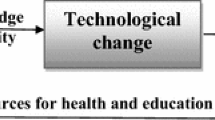Abstract
This study examines the effect of trade openness on the health outcomes of 12 countries in the MENA (Middle East and North Africa) region: Algeria, Bahrain, Egypt, Jordan, Morocco, Kuwait, Oman, Qatar, Saudi Arabia, Tunisia, Turkey, and the UAE. By using a panel data investigation over 1970–2015, we check whether the trade of these countries with developed economies (using the proxy of G7 countries) and the rest of the world affects life expectancy and the infant mortality rate. We also assess the moderating effect of governmental corruption. Our findings show two interesting results. First, trade openness has a positive effect on health in the MENA region as it reduces the infant mortality rate and boosts life expectancy for both men and women. Second, better control over corruption and more focus on trade with developed countries would lead to more technology and information spillovers, which positively affect the health sector.
Similar content being viewed by others
Notes
Tsai (2007) was the first to investigate the relationship between globalization and health.
“[…] The more a country is involved in international organizations, the more likely its elites are to have absorbed some of the anticorruption norms, and the lower the level of corruption should be” (Sandholtz and Gray 2003, p. 767). However, developing countries face a challenge regarding corruption. Indeed, it seems that trade openness may amplify corruption and accentuate its misdeeds, as when firms are unable to cope with international competition, they might use corruption to preserve a part of the rent they enjoyed. Corruption then appears as the result of a lack of the adaptability of local companies to the requirements of a competitive environment.
The variable trade openness enters with a lag as any causal relationship between health and trade is not expected to be contemporaneous (Owen and Wu 2007).
References
Antweiler W, Copeland B, Taylor S (2001) Is free trade good for the environment? Amer Econ Rev 91(4):877–908
Arrow KJ (1963) Social choice and individual values. Yale University Press, US
Asongu SA (2014) The impact of health worker migration on development dynamics: evidence of wealth effects from Africa. Eur J Health Econ 15(2):187–201
Bergh A, Nilsson T (2010) Good for living? On the relationship between globalization and life expectancy. World Dev 38(9):1191–1203
Bussmann M (2009) The effect of trade openness on women’s welfare and work life. World Dev 37(6):1027–1038
Cavallo E, Frankel J (2008) Does openness to trade make countries more vulnerable to sudden stops, or less? Using gravity to establish causality. J Int Money Financ 27(8):1430–1452
Coe DT, Helpman E (1995) International R&D spillovers. Eur Econ Rev 39:859–887
Dickey D, Fuller W (1979) Distribution of the estimator for the autoregressive time series with a unit root. J Amer Stat Assoc 74:427–431
Dreher A (2006) Does globalization affect growth? Evidence from a new index of globalization. Appl Econ 38(10):1091–1110
Eiras A, Schaeffer B (2001) Trade: the best way to protect the environment. Heritage Foundation backgrounder no 1480. http://www.heritage.org/trade/report/trade-the-best-way-protect-the-environment
Frankel J, Romer D (1999) Does trade cause growth. Amer Econ Rev 89(3):379–399
Frankel JA, Rose AK (2005) Is trade good or bad for the environment? Sorting out the causality. Rev Econ Stat 87(1):85–91
Gatti R (2004) Explaining corruption: are open countries less corrupt? J Int Dev 16(6):851–861
Grossman, M, Krueger AB (1993) Environmental impacts of the North America Free Trade Agreement in the U.S.-Mexico Free trade agreement, P. Garber, ed. Cambridge, MA: MIT Press
Grossman M, Krueger AB (1995) Economic growth and the environment. Q J Econ 110(2):353–377
Harrison A (1996) Openness and growth: a time-series, cross-country analysis for developing countries. J Dev Econ 48:419–447
Huntington SP (1968) Political order in changing societies. Yale University Press, New Haven
Im KS, Pesaran MH, Shin Y (2003) Testing for unit roots in heterogeneous panels. J Econ 115:53–74
Levine DI, Rothman D (2006) Does trade affect child health? J Health Econ 25:538–554
Lucas REB, Wheeler D, Hettige H (1992) Economic development, environmental regulation and the international migration of toxic industrial pollution: 1960–88. In Low P (ed) international trade and the environment. World Bank discussion paper no. 159
Lui FT (1985) An equilibrium queuing model of bribery. J Polit Econ 93(4):760–781
Managi S, Hibiki A, Tsurumi T (2009) Does trade openness improve environmental quality? J Environ Econ Manag 58(3):346–363
Owen AL, Wu S (2007) Is trade good for your health? Rev Int Econ 15(4):660–682
Phillips PCB, Perron P (1988) Testing for a unit root in time series regression. Biometrika 75(2):335–346
Rodrik D, Subramanian A, Trabbi F (2004) Institutions rule: the primacy of institutions over geography and integration in economic development. J Econ Growth 9:131–165
Sandholtz W, Gray MM (2003) International integration and national corruption. Int Organ 57(4):761–800
Shleifer A, Vishny RW (1993) Corruption. Q J Econ 108(3):599–617
Tsai M-C (2007) Does globalization affect human well-being? Soc Indic Res 81:103–126
Author information
Authors and Affiliations
Corresponding author
Rights and permissions
About this article
Cite this article
Jawadi, F., El Gouddi, S., Ftiti, Z. et al. Assessing the Effect of Trade Openness on Health in the MENA Region: a Panel Data Analysis. Open Econ Rev 29, 469–479 (2018). https://doi.org/10.1007/s11079-017-9450-3
Published:
Issue Date:
DOI: https://doi.org/10.1007/s11079-017-9450-3




